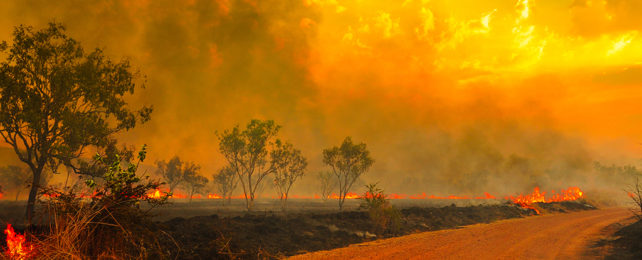A new report from a coalition of international scientists is unequivocal about the severity of the environmental crisis that we're in, with 16 out of the 35 'vital signs' used to track climate change now rated as code red – that is, they're at record extremes.
The number of climate-related disasters is escalating, the report warns, with related human suffering – already at levels that are difficult to quantify and imagine – set to keep on rising rapidly as well.
We're now faced with a stark choice: make quick and meaningful changes to the way we live our lives and treat the planet, or face the very real possibility of global societal collapse further down the line.
"As we can see by the annual surges in climate disasters, we are now in the midst of a major climate crisis, with far worse to come if we keep doing things the way we've been doing them," says ecologist Christopher Wolf from Oregon State University.
"We implore our fellow scientists to join us in advocating for research-based approaches to climate and environmental decision-making."
Some of the issues that the team points towards include the increasing frequency of extreme heat events, rising global tree cover loss (with wildfires playing a major role in that), and more cases of the mosquito-borne dengue virus.
There's also the matter of atmospheric carbon dioxide levels, which are now at their highest since records began: 418 parts per million. Meanwhile, 2022 is on track to be one of the hottest years on record.
Other vital signs tracked by the researchers include surface temperature anomalies, Antarctica ice mass change, ocean acidity, and major floods in the US costing at least a billion dollars to clean up.
The report also mentions numerous climate change-related events that have occurred just this year: the worst drought in Europe in 500 years, for example; record-breaking rainfall on the east coast of Australia; a deadly heat wave in India and Pakistan; widespread dust storms in the Middle East; and a severe flood that destroyed roads in Yellowstone National Park in the US, to name a few.
"Climate change is not a standalone issue," says sustainability scientist Saleemul Huq from Independent University, Bangladesh. "It is part of a larger systemic problem of ecological overshoot where human demand is exceeding the regenerative capacity of the biosphere."
"To avoid more untold human suffering, we need to protect nature, eliminate most fossil fuel emissions and support socially just climate adaptations with a focus on low-income areas that are most vulnerable."
Experts predict a rise of 3 degrees Celsius in terms of global warming by 2100, a temperature level that the planet hasn't seen for some 3 million years. However, despite repeated warnings, many trends are still going in the wrong direction.
The researchers have put together a 35-minute documentary called The Scientist's Warning to spur more action and increase awareness. They're hoping that more and more scientists now make a stand about the urgent action that needs to be taken.
There is still hope. The researchers note an unprecedented numbers of scientists are speaking out about the climate crisis, and are calling for "massive-scale climate change mitigation and adaptation" to happen immediately for the sake of future generations.
"Look at all of these heat waves, fires, floods and massive storms," says ecologist William Ripple, from Oregon State University. "The specter of climate change is at the door and pounding hard."
The research has been published in BioScience.
